2020年春人教新目标英语八年级下册unit2-知识点分析与练习(无答案)
- 格式:doc
- 大小:64.00 KB
- 文档页数:8
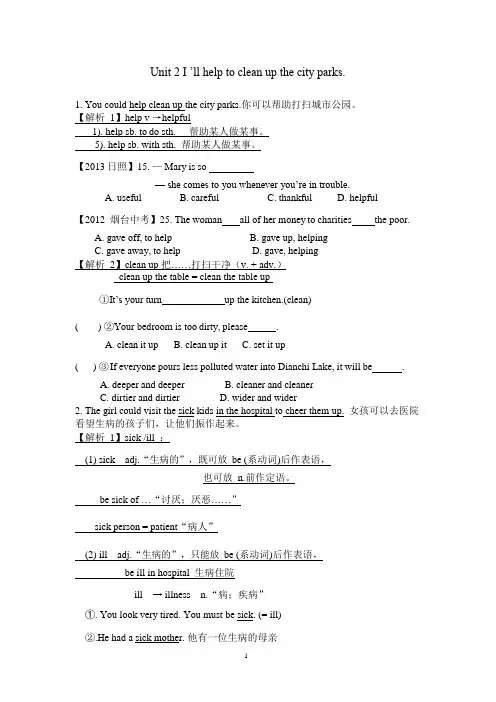
Unit 2 I ’ll help to clean up the city parks.1.You could help clean up the city parks.你可以帮助打扫城市公园。
【解析1】help v →helpful1). help sb. to do sth. 帮助某人做某事。
5). help sb. with sth. 帮助某人做某事。
【2013 日照】15. —Mary is so—she comes to you whenever you’re in trouble.efulB. carefulC. thankfulD. helpful【2012 烟台中考】25. The woman all of her money to charities the poor.A. gave off, to helpB. gave up, helpingC. gave away, to helpD. gave, helping【解析2】clean up 把……打扫干净(v. + adv.)clean up the table = clean the table up①It’s your turn up the kitchen.(clean)( ) ②Your bedroom is too dirty, please .A. clean it upB. clean up itC. set it up( ) ③If everyone pours less polluted water into Dianchi Lake, it will be .A. deeper and deeperB. cleaner and cleanerC. dirtier and dirtierD. wider and wider2.The girl could visit the sick kids in the hospital to cheer them up. 女孩可以去医院看望生病的孩子们,让他们振作起来。
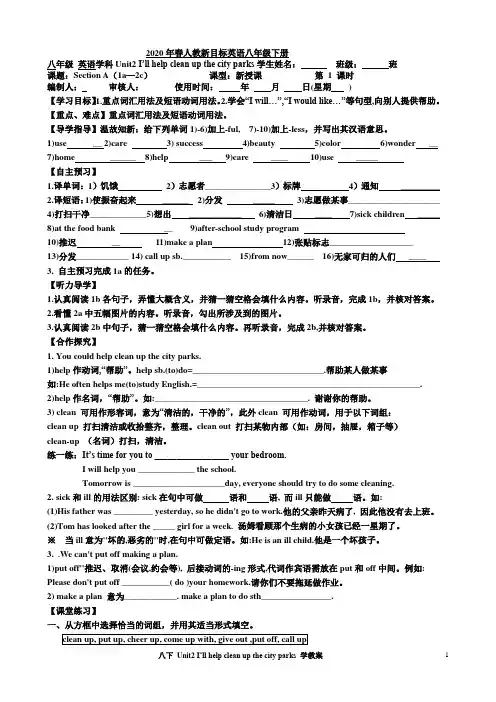
2020年春人教新目标英语八年级下册八年级英语学科Unit2 I’ll help clean up the city parks学生姓名:班级:班课题:Section A(1a—2c)课型:新授课第1 课时编制人:审核人:使用时间:年月日(星期)【学习目标】1.重点词汇用法及短语动词用法。
2.学会“I will…”,“I would like…”等句型,向别人提供帮助。
【重点、难点】重点词汇用法及短语动词用法。
【导学指导】温故知新:给下列单词1)-6)加上-ful, 7)-10)加上-less,并写出其汉语意思。
1)use __ 2)care 3) success 4)beauty 5)color 6)wonder __ 7)home ______ 8)help ___ 9)care ____ 10)use _____【自主预习】1.译单词:1)饥饿2)志愿者_______________3)标牌4)通知_________2.译短语:1)使振奋起来______ 2)分发_____ 3)志愿做某事_____________________ 4)打扫干净_____________5)想出____________ 6)清洁日____ 7)sick children _____ 8)at the food bank __ 9)after-school study program10)推迟__ 11)make a plan 12)张贴标志___________________13)分发____________ 14) call up sb.___________ 15)from now______ 16)无家可归的人们____ 3. 自主预习完成1a的任务。
【听力导学】1.认真阅读1b各句子,弄懂大概含义,并猜一猜空格会填什么内容。
听录音,完成1b,并核对答案。
2.看懂2a中五幅图片的内容。
听录音,勾出所涉及到的图片。
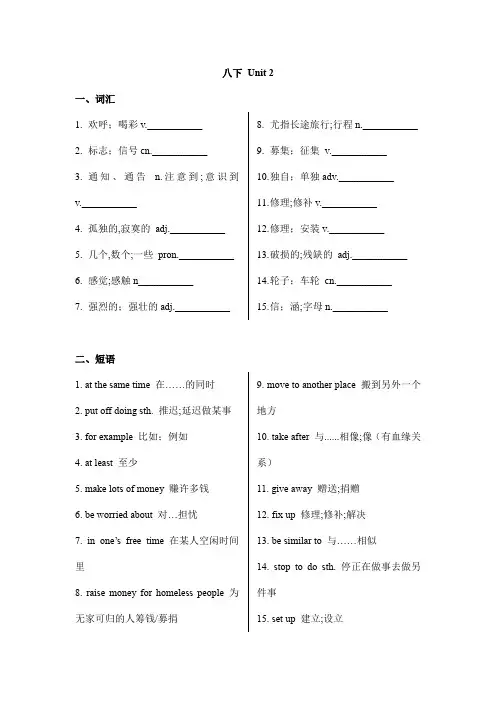
八下Unit 2一、词汇1.欢呼;喝彩v.___________2.标志;信号cn.___________3.通知、通告n.注意到;意识到v.___________4.孤独的,寂寞的adj.___________5.几个,数个;一些pron.___________6.感觉;感触n___________7.强烈的;强壮的adj.___________8.尤指长途旅行;行程n.___________9.募集;征集v.___________10.独自;单独adv.___________11.修理;修补v.___________12.修理;安装v.___________13.破损的;残缺的adj.___________14.轮子;车轮cn.___________15.信;涵;字母n.___________二、短语1. at the same time 在……的同时2. put off doing sth. 推迟;延迟做某事3. for example 比如;例如4. at least 至少5. make lots of money 赚许多钱6. be worried about 对…担忧7. in one’s free time 在某人空闲时间里8. raise money for homeless people 为无家可归的人筹钱/募捐9. move to another place 搬到另外一个地方10. take after 与......相像;像(有血缘关系)11. give away 赠送;捐赠12. fix up 修理;修补;解决13. be similar to 与……相似14. stop to do sth. 停正在做事去做另件事15. set up 建立;设立16. make a difference to 对…有影响17. a friend of mine=one of my friends 我的一个朋友18. be/get excited about sth/doing sth 对某事(做某事)而感到激动19. have difficulty (in) doing sth 在做某事方面有困难20. make it possible for sb. to do sth. 使某人有可能做某事三、重点句型1.how to care for animals 如何照顾动物们2.You could help to clean up the city parks. 你可以帮着清洁城市公园3.You helped to make it possible for me to have Lucky. 你帮助我, 使我能够拥有Lucky4.Most people would never think about this, but many people have these difficulties.大多数人从没考虑过这一点,但是许多人有这样的困难5.I can’t use my arms or legs well, so normal things like answering the telephone,opening and closing doors, or carrying things are difficult for me. 因为我不能灵活地使用胳膊和腿, 因此像接电话、开关门或提东西等这些正常的事对我来说都很困难6.The ideas that he came up with worked out fine. 他想出的主意效果非常好四、词汇讲解1. clean up2. cheer up3. give out4. put off5. notice6. lonely7. raise8. repair9. imagine讲解版1. clean upclean up意为“打扫”如果宾语为代词,应放在短语中间;如果宾语是名词,可放于短语之间或两词之后。
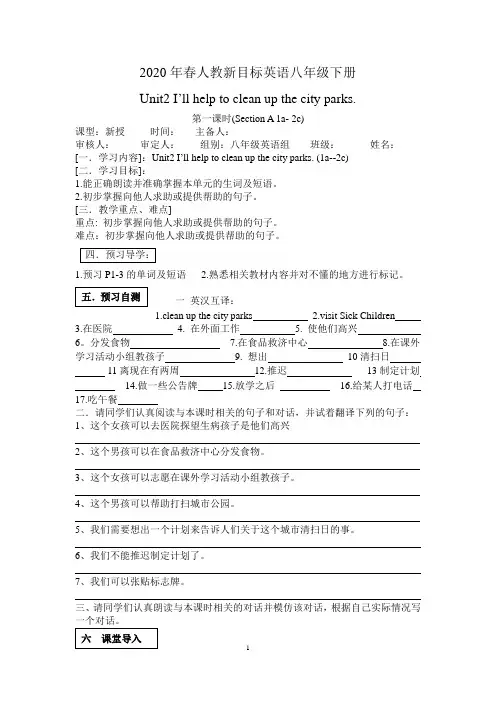
2020年春人教新目标英语八年级下册Unit2 I’ll help to clean up the city parks.第一课时(Section A 1a- 2c)课型:新授时间:主备人:审核人:审定人:组别:八年级英语组班级:姓名:[一.学习内容]:Unit2 I’ll help to clean up the city parks. (1a--2c)[二.学习目标]:1.能正确朗读并准确掌握本单元的生词及短语。
2.初步掌握向他人求助或提供帮助的句子。
[三.教学重点、难点]重点: 初步掌握向他人求助或提供帮助的句子。
难点:初步掌握向他人求助或提供帮助的句子。
1.预习P1-3的单词及短语2.熟悉相关教材内容并对不懂的地方进行标记。
一英汉互译:1.clean up the city parks2.visit Sick Children3.在医院4. 在外面工作5. 使他们高兴6。
分发食物7.在食品救济中心_____8.在课外学习活动小组教孩子9. 想出10清扫日______ 11离现在有两周_____12.推迟13制定计划__ ____ 14.做一些公告牌15.放学之后16.给某人打电话17.吃午餐二.请同学们认真阅读与本课时相关的句子和对话,并试着翻译下列的句子:1、这个女孩可以去医院探望生病孩子是他们高兴2、这个男孩可以在食品救济中心分发食物。
3、这个女孩可以志愿在课外学习活动小组教孩子。
4、这个男孩可以帮助打扫城市公园。
5、我们需要想出一个计划来告诉人们关于这个城市清扫日的事。
6、我们不能推迟制定计划了。
7、我们可以张贴标志牌。
三、请同学们认真朗读与本课时相关的对话并模仿该对话,根据自己实际情况写一个对话。
让学生小组回忆以前所学的有关于委婉(一)教学步骤1. 解读学习目标,学习新词汇2.教师通过玩游戏”Touch your ---”,然后引出询问向他人求助或提供帮助的句子:A: I like reading books.What could you do? B:You could volunteerin an after-school study program to teach kids. (选出写的好的小组进行加分)并核查预习案3.给学生5分钟的时间,让他们模仿1a中的短语进行相互问答练习并把他们编的对话写下来,听听力完成1 b,然后进行相互问答练习。
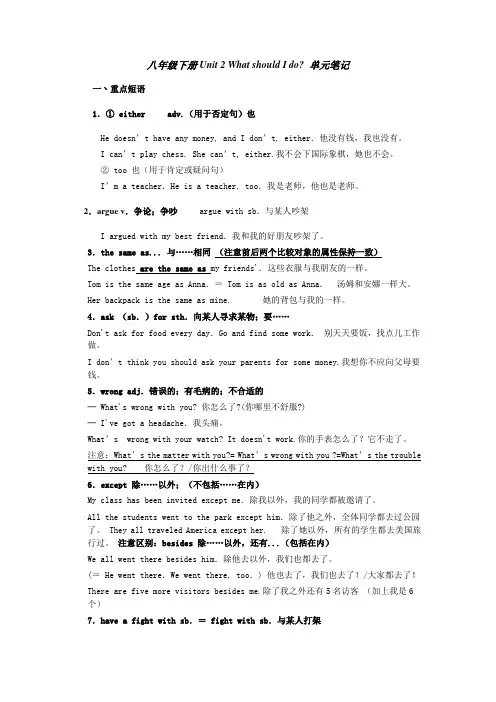
八年级下册Unit 2 What should I do? 单元笔记一丶重点短语1.① either adv.(用于否定句)也He doesn’t have any money, and I don’t, either.他没有钱,我也没有。
I can’t play chess. She can’t, either.我不会下国际象棋,她也不会。
② too 也(用于肯定或疑问句)I’m a teacher.He is a teacher, too.我是老师,他也是老师。
2.argue v.争论;争吵 argue with sb.与某人吵架I argued with my best friend.我和我的好朋友吵架了。
3.the same as... 与……相同(注意前后两个比较对象的属性保持一致)The clothes are the same as my friends'.这些衣服与我朋友的一样。
Tom is the same age as Anna.= Tom is as old as Anna.汤姆和安娜一样大。
Her backpack is the same as mine. 她的背包与我的一样。
4.ask (sb.)for sth.向某人寻求某物;要……Don't ask for food every day.Go and find some work.别天天要饭,找点儿工作做。
I don’t think you should ask your parents for some money.我想你不应向父母要钱。
5.wrong adj.错误的;有毛病的;不合适的─ What's wrong with you? 你怎么了?(你哪里不舒服?)─ I've got a headache.我头痛。
What’s wrong with your watch? It doesn't work.你的手表怎么了?它不走了。
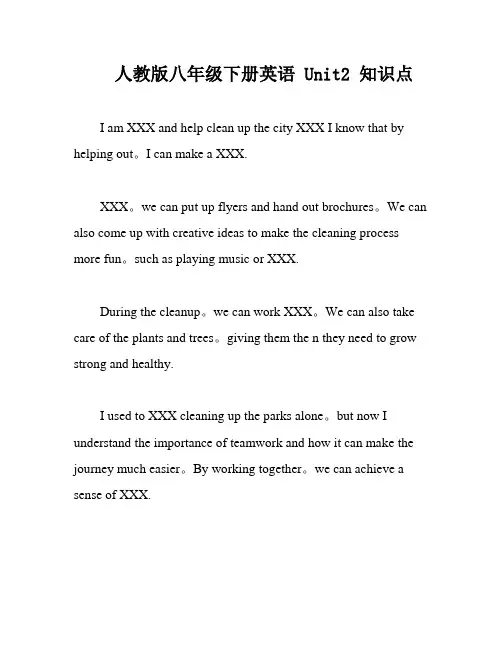
人教版八年级下册英语 Unit2 知识点I am XXX and help clean up the city XXX I know that by helping out。
I can make a XXX.XXX。
we can put up flyers and hand out brochures。
We can also come up with creative ideas to make the cleaning process more fun。
such as playing music or XXX.During the cleanup。
we can work XXX。
We can also take care of the plants and trees。
giving them the n they need to grow strong and healthy.I used to XXX cleaning up the parks alone。
but now I understand the importance of teamwork and how it can make the journey much easier。
By working together。
we can achieve a sense of XXX.If you're XXX。
please don't hesitate to call up and join us。
Let's cheer up the city parks and make them a place of beauty and joy for all to enjoy.Tom helps Lucy learn English。
He assists XXX.To boost the players' morale。
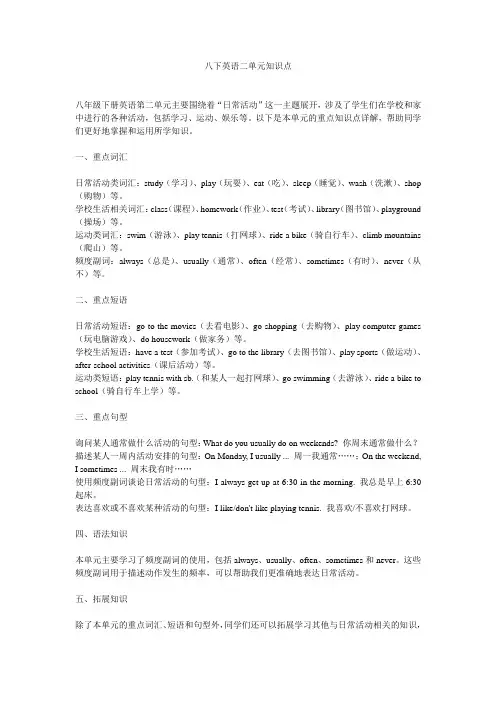
八下英语二单元知识点八年级下册英语第二单元主要围绕着“日常活动”这一主题展开,涉及了学生们在学校和家中进行的各种活动,包括学习、运动、娱乐等。
以下是本单元的重点知识点详解,帮助同学们更好地掌握和运用所学知识。
一、重点词汇日常活动类词汇:study(学习)、play(玩耍)、eat(吃)、sleep(睡觉)、wash(洗漱)、shop (购物)等。
学校生活相关词汇:class(课程)、homework(作业)、test(考试)、library(图书馆)、playground (操场)等。
运动类词汇:swim(游泳)、play tennis(打网球)、ride a bike(骑自行车)、climb mountains (爬山)等。
频度副词:always(总是)、usually(通常)、often(经常)、sometimes(有时)、never(从不)等。
二、重点短语日常活动短语:go to the movies(去看电影)、go shopping(去购物)、play computer games (玩电脑游戏)、do housework(做家务)等。
学校生活短语:have a test(参加考试)、go to the library(去图书馆)、play sports(做运动)、after-school activities(课后活动)等。
运动类短语:play tennis with sb.(和某人一起打网球)、go swimming(去游泳)、ride a bike to school(骑自行车上学)等。
三、重点句型询问某人通常做什么活动的句型:What do you usually do on weekends? 你周末通常做什么?描述某人一周内活动安排的句型:On Monday, I usually ... 周一我通常……;On the weekend, I sometimes ... 周末我有时……使用频度副词谈论日常活动的句型:I always get up at 6:30 in the morning. 我总是早上6:30起床。
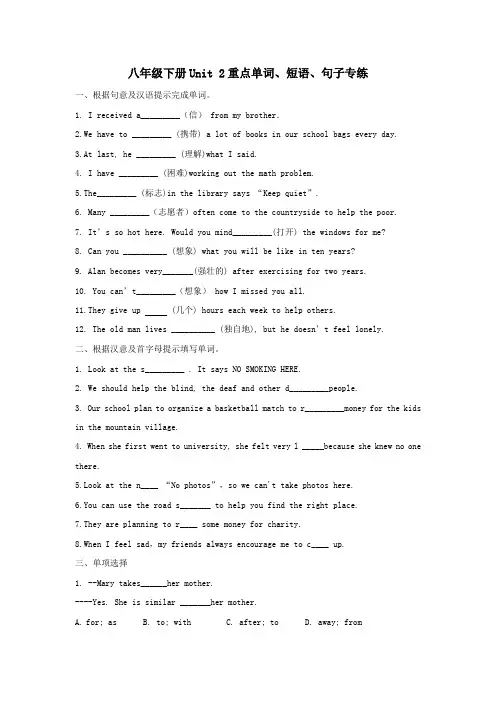
八年级下册Unit 2重点单词、短语、句子专练一、根据句意及汉语提示完成单词。
1. I received a_________(信) from my brother.2.We have to _________ (携带) a lot of books in our school bags every day.3.At last, he _________ (理解)what I said.4. I have _________ (困难)working out the math problem.5.The_________ (标志)in the library says “Keep quiet”.6. Many _________(志愿者)often come to the countryside to help the poor.7. It’s so hot here. Would you mind_________(打开) the windows for me?8. Can you __________ (想象) what you will be like in ten years?9. Alan becomes very_______(强壮的) after exercising for two years.10. You can’t_________(想象) how I missed you all.11.They give up (几个) hours each week to help others.12. The old man lives __________ (独自地), but he doesn’t feel lonely.二、根据汉意及首字母提示填写单词。
1. Look at the s_________ . It says NO SMOKING HERE.2. We should help the blind, the deaf and other d_________people.3. Our school plan to organize a basketball match to r_________money for the kids in the mountain village.4. When she first went to university, she felt very l _____because she knew no one there.5.Look at the n____ “No photos”,so we can't take photos here.6.You can use the road s_______ to help you find the right place.7.They are planning to r____ some money for charity.8.When I feel sad,my friends always encourage me to c____ up.三、单项选择1. --Mary takes______her mother.----Yes. She is similar _______her mother.A.for; asB. to; withC. after; toD. away; from2. ---Look, the man can’t see anything. He is _______.-----Oh, let’s help him to cross the street.A.strongB. blindC. deafD. clever3. Mary got the first prize in the piano competition. It made her mother _____.A.SatisfactionB. satisfiedC. surpriseD. surprising4. ----What’s the news about ?People near the lake didn’t allow them to ____a factory so as not to pollute the water.A.look upB. put upC. take upD. set up5. ---Shall we go on Friday or Saturday ?-----Either day is OK. It makes no _________ to me.A. choiceB. changeC. differenceD. decision6. ---Mom, can I leave the chores till tomorrow ?-----I’m afraid not. You can’t _______today’s work till tomorrow.A.put offB. turn downC. give awayD. look up7. I can’t go shopping with you because I have to ______my mother. She is ill.A.take downB. depend onC. care forD. give up8.---I know Old Joe lives __________.----We are supposed to visit him from time to time. Then he won’t feel ____.A.alone; aloneB. lonely; lonelyC. lonely; aloneD. alone; lonely9. Many people are ________about the new movie by Jackie Chan. They think the movie is _____________.A. excited; excitedB. exciting; excitingC. excited; excitingD. exciting; excited10.---You should do what you can ______your English, Li Ming.----OK. I will. Thank you, Ms. Hu.A.improveB. to improveC. improvingD. improved四、用括号内所给词的适当形式填空1. He _________(volunteer) to act as a guide to the Palace Museum yesterday afternoon.2. Bruce was sad yesterday. Let’s go and ________(cheer) him up.3. This sign ________ (mean) “No Parking”. So your car can’t park here.4. Look at the ________(notice). It says we are going to have a sports meeting.5. Many children in the countryside feel very ________(lonely).五、选用方框中适当的短语,并用其正确形式填空。
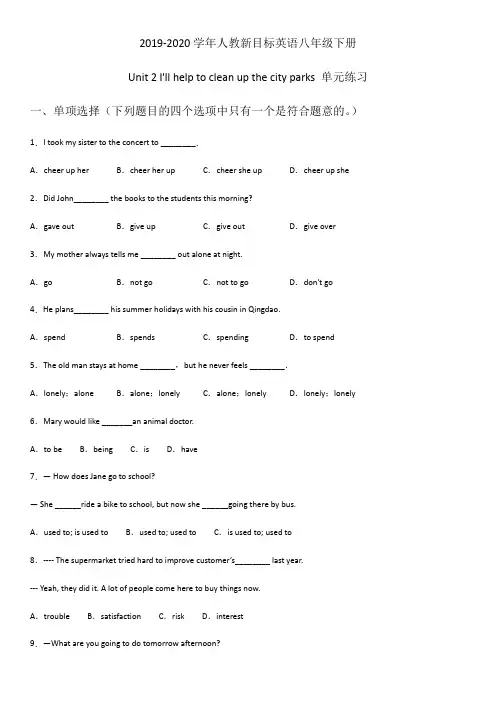
2019-2020学年人教新目标英语八年级下册Unit 2 I'll help to clean up the city parks 单元练习一、单项选择(下列题目的四个选项中只有一个是符合题意的。
)1.I took my sister to the concert to ________.A.cheer up her B.cheer her up C.cheer she up D.cheer up she 2.Did John________ the books to the students this morning?A.gave out B.give up C.give out D.give over3.My mother always tells me ________ out alone at night.A.go B.not go C.not to go D.don't go4.He plans________ his summer holidays with his cousin in Qingdao.A.spend B.spends C.spending D.to spend 5.The old man stays at home ________,but he never feels ________.A.lonely;alone B.alone;lonely C.alone;lonely D.lonely;lonely 6.Mary would like _______an animal doctor.A.to be B.being C.is D.have7.— How does Jane go to school?— She ______ride a bike to school, but now she ______going there by bus.A.used to; is used to B.used to; used to C.is used to; used to8.---- The supermarket tried hard to improve customer’s________ last year.--- Yeah, they did it. A lot of people come here to buy things now.A.trouble B.satisfaction C.risk D.interest9.—What are you going to do tomorrow afternoon?—I’m not sure. I have a meeting.A.may B.shall C.must D.can10.—Why did you ask me all those questions?— if you remember the story.A.Saw B.Seeing C.To see D.See11.He spent a lot of time on English. ______, he got the most points in the English test.A.In fact B.Otherwise C.As a result D.However12.Linda worked hard and finally she ________get an A in the exam.A.was able to B.had toC.is able to D.has to13.If you get there,please________.A.call us on B.call us up C.call us to D.call us off14.I think you can ______ how surprised I was when they told me the news.A.hope B.imagine C.think D.expect15.Alice has the same taste of clothes as I and her clothes are ______ mine.A.interested in B.similar toC.popular with D.different from16.Helen volunteered _______ a Thanksgiving party at her house this year.A.have B.to haveC.having D.had二、完形填空One day, Peter had a fight with one of his classmates. Then he went to his grandfather and told him his story 17 “He is really bad,”the boy said,“and I 18 him.”The grandfather said,“ 19 me tell you a story. When I was a boy, I too, sometimes hated others for what they did.”As Peter 20 carefully, the grandfather went on.“There are always two tigers inside my heart. One is 21 and kind. He gets on well 22 everything around him. But 23 is bad and unfriendly. Even the smallest thing will make him angry. He fights with everyone all the time, and for no reason. He can’t think carefully 24 he always hates others. It is difficult to live with these two tigers inside my heart. They both try to control(控制)me.”Peter looked into his grandfather’s 25 and asked,“ 26 tiger always controls you, Grandfather?”The old man said slowly and seriously,“The one that I feed. I always feed the good and kind tiger, so I never hate others and seldom(很少)get angry now.”17.A.happily B.friendly C.hardly D.angrily18.A.love B.hate C.know D.enjoy19.A.Make B.Help C.Let D.Ask20.A.saw B.felt C.talked D.listened21.A.good B.bad C.lazy D.quiet22.A.at B.on C.with D.about23.A.other B.others C.another D.the other24.A.because B.though C.before D.but25.A.eyes B.ears C.nose D.mouth26.A.Who B.Which C.Where D.When三、阅读理解Mrs. Gill lived next door to Nita. Every afternoon, Mrs. Gill took a walk. She said it kept her young. Nita liked to talk with Mrs. Gill when Mrs. Gill came back. Mrs. Gill was always happy after her walk. She often showed Nita something she had found, like a beautiful red leaf (叶子).One afternoon, Mrs. Gill looked upset. Nita asked her why.“I am sad about all the trash (垃圾) on the street,” she said. “I never saw so much trash in this neighborhood! What happened?”“Mrs. Trent moved,” said Nita. “She used to go out each morning and pick up trash. I often saw her on my way to school.”Mrs. Gill looked very ▲ . “I thought I knew everything about this neighborhood!” she said. “But you see more than I do!”“Well, I wish I could do Mrs. Trent’s job. But you know, my back (背) often hurts. It’s really hard for me to pick things up,” she added.“I could do that,” said Nita.Mrs. Gill said, “I will carry the trash bag! You can use my gloves (手套) so your hands can stay clean.”Nita put on the gloves. She picked up pieces of paper. She picked up boxes. And Mrs. Gill carried the bag. Lots of people stopped to thank Mrs. Gill and Nita. The street looked much better.“Thanks, Nita,” said Mrs. Gill. “Let’s call ourselves the clean-up team!”27.From Paragraph 1, we can know that Mrs. Gill went for a walk _______.A.with her dogB.with Mrs. TrentC.every morningD.every afternoon28.Why did Mrs. Gill look upset one day?A.Because Mrs. Trent moved to another city.B.Because she saw no red leaves on the street.C.Because there was so much trash on the street.D.Because people laughed at her on her way home.29.The best word for “ ▲ ” is “_______”.A.afraidB.surprisedC.worriedD.satisfied30.Which of the following is TRUE according to the passage?A.Nita hurt her back last week.B.Mrs. Trent once worked in Nita’s school.C.Mrs. Gill bought a new pair of gloves for Nita.D.Mrs. Gill and Nita got lots of thanks for their hard work.31.What might be the best title of the passage?A.A lazy womanB.A small accidentC.A clean-up teamD.A special neighborhood四、根据句意和首字母完成单词。
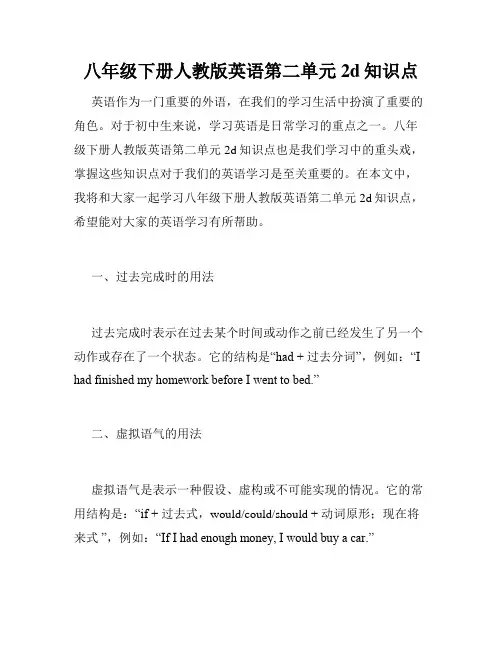
八年级下册人教版英语第二单元2d知识点英语作为一门重要的外语,在我们的学习生活中扮演了重要的角色。
对于初中生来说,学习英语是日常学习的重点之一。
八年级下册人教版英语第二单元2d知识点也是我们学习中的重头戏,掌握这些知识点对于我们的英语学习是至关重要的。
在本文中,我将和大家一起学习八年级下册人教版英语第二单元2d知识点,希望能对大家的英语学习有所帮助。
一、过去完成时的用法过去完成时表示在过去某个时间或动作之前已经发生了另一个动作或存在了一个状态。
它的结构是“had + 过去分词”,例如:“I had finished my homework before I went to bed.”二、虚拟语气的用法虚拟语气是表示一种假设、虚构或不可能实现的情况。
它的常用结构是:“if + 过去式,would/could/should + 动词原形;现在将来式”,例如:“If I had enough money, I would buy a car.”三、倒装语序英语中有很多种倒装语序,通常情况下是为了加强语气或者使语句更加清晰易懂。
例如:“Not only did he study En glish, but he also learned French.”四、固定搭配的用法英语中存在大量的固定搭配,掌握这些固定搭配对于我们的英语学习是非常有帮助的。
例如:“make friends”、“take part in”等。
五、情态动词的用法情态动词通常表示说话者的态度、意图、能力、推测等,它们有“can, could, may, might, must, shall, should, will, would”等。
例如:“I can swim very well.”总之,八年级下册人教版英语第二单元2d知识点是我们英语学习中的重点之一。
要想掌握这些知识点,我们需要抓住重点,勤加练习,多听多读多记多练,相信我们的英语水平一定会不断提高。
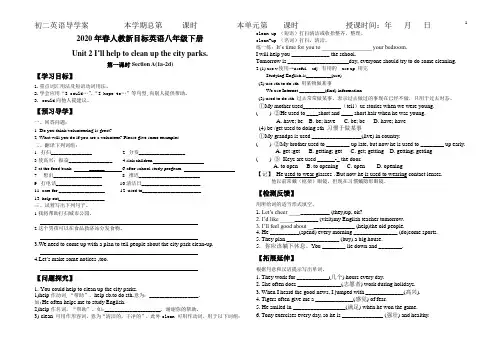
2020年春人教新目标英语八年级下册Unit 2 I’ll help to clean up the city parks.第一课时Section A(1a-2d)【学习目标】1.重点词汇用法及短语动词用法。
2.学会应用“I could…”、“I hope to…”等句型,向别人提供帮助。
3. could向他人提建议。
【预习导学】一、回答问题:1. Do you think volunteering is great?2. What will you do if you are a volunteer? Please give some examples.二、翻译下列词组:1. 打扫________________2. 分发__________________3.使高兴;振奋_________________4.sick children5.at the food bank ______6.after-school study program7.想出___________________ 8. 推迟________________________9. 打电话__________________ 10.清洁日_______________________11. care for __________________ 12. used to_______________________13. help out__________________三、试着写出下列句子。
1.我将帮助打扫城市公园。
2.这个男孩可以在食品救济站分发食物。
3.We need to come up with a plan to tell people about the city park clean-up.4.Let’s make some notices ,too.【问题探究】1. You could help to clean up the city parks.1)help作动词,“帮助”。
The shortest way to do many things is to only one thing at a time and人教版八年级英语下册第Unit2 SectionA 练习题(无答案)1 / 2Unit2 Section A 练习题一.Choose the proper words from the box and complete the sentences.(从方框中选择恰当的单词完成句子。
每空一词,每词只用一次。
)Volunteer lonely journey owner notices 1.Tom is a in an old people’s home in our city.2.Yesterday I went to a bookstore and bought interesting books 3.Who is the of that dog?It’s running everywhere.4.We had a great last summer.5.We need to make some for the Clean-up Day.6.Lots of old people are .We should care for them.二.Choose the proper words to complete the sentences .(选择适当的单词完成句子。
)1.The girl often visits the sicks kids in the hospital to cheer up .(them /they)2.We’ll help up the city parks .(cleaning/to clean)3.They need to come up a plan for the party .(at /with)4.--Tom ,what did your mother say? --Oh,she asked me her in the kitchen.(help/to help)5.Mary is a book (lover/love).she enjoys reading books .6.The old man has no families and friends ;he often feels very .(lonely/alone)三.Complete the following English sentences according to the Chinese .(根据汉语意思完成英语句子,每空一词。
第 1 页 (共4 页) 第 2 页 (共4 页)学校 姓名 班级 考场 考号---------------------------------○密------------------ -------------------○封----------------------------- -- --○线----------------------------※※※※※※※※※※※※※※※答※※※※※※※※※※※※※※※※※※题※※※※※※※※※※※※※※※※线※※※※※※※※※※※※※新目标英语八年级下册Unit 2 What should I do?讲解与练习班级 姓名重点词组及句型:1. argue with sb. 与某人争论/辩论2. have an argument with sb. 与某人发生争论3. out of style 不时髦的4. in style 时髦的5. keep out 不让……进入6. call sb. up 打电话给……7. on the phone 用电话交谈8. pay for 付款9. part-time job 兼职工作10. Teen Talk 青少年论坛11. the same as 与……同样的 12. get on well with... 与……相处地好13. as much as possible 尽可能多14. all kinds of 各种各样15. on the one hand 一方面 on the other hand 另一方面16. borrow sth. from sb. 向某人借某 17. find out 找出 18. be popular at school 在学校受欢迎 19. except me 除了我20. have a quick supper 很快地吃晚餐 21. not…until 直到……才22. try to do 尽力去做 23. complain about doing sth. 抱怨做某事24. seem to do… 好像… 25. comparing…with… 把……与……做比较26. think for 为……着想27. find it + adj.+ to do sth. 发现做某事很……28. learn to do 学会做某事 29. have a fight with 与……打架 30. write sb. a letter 给某人写信 31. a ticket to a ball game 一场球赛的票 32. surprise sb. 使某人惊讶33. buy sb. sth. 为某人买某物 34. have no idea 不知道 35. have the same haircut 有同样的发型 36. get a tutor 请家教 37. need to do 需要去做 38. invite sb. to do sth. 邀请某人去做某事 39. leave sth. at home 把某物落在家里 40. fail (in) sth. 做某事失败 41. be the same as 与……相同的 42. return sth. 归还某物43. look up…in a dictionary 在字典中查找…… 44. be/feel under (too much) pressure 感觉处于(太多的)压力之下 45. take sb. from +名词+to+名词 把某人从一个地方带到另一个地方 46. fit as much as possible into their kids lives 尽可能多地充实到孩子们的生活中来47. nothing new 屡见不鲜 48. push sb hard 厉害地强迫某人49. be always doing 总是在做某事 50. plan to do 计划做某事 51. start from a very young age 从很小的年龄开始 日常用语:学习用于表达建议的句子结构:1. ---What should I do? ---You could write him a letter.2. --- What should he do? --- Maybe he should say he's sorry.3. --- What should they do?--- They shouldn't argue.4. What’s the matter? / What’s wrong?5. Why don’t yo u talk to him about it? 精讲巧练1. I don't have enough money. 我没有足够的钱。
英语八年级下册unti2知识点英语八年级下册Unit 2知识点英语八年级下册Unit 2的主要内容是介绍公共交通工具,学生需要掌握与公共交通相关的词汇和语法,了解世界各地的交通方式。
一、词汇1. transportation (n.) 交通运输2. traveler (n.) 旅客3. transport (v.) 运输,搬运4. vehicle (n.) 车辆5. subway (n.) 地铁6. subway station (n.) 地铁站7. bus (n.) 公交车8. bus stop (n.) 公交车站9. taxi (n.) 出租车10. bridge (n.) 桥11. intersection (n.) 十字路口12. pedestrian (n.) 行人13. traffic light (n.) 交通灯14. highway (n.) 高速公路15. tram (n.) 有轨电车二、语法1. 现在进行时现在进行时用来描述正在进行的动作或状态,结构为 be + 动词+ ing,例如:I am taking the subway to work. 我正在坐地铁去上班。
They are walking to the bus stop. 他们正在步行去公交车站。
2. 一般现在时一般现在时用来描述经常性或习惯性的动作或状态,结构为主语+动词原形,例如:She usually takes the bus to school. 她通常乘公交车去上学。
The traffic light turns red. 交通灯变为红色。
3. 介词 in 和 on 的用法in 用来表示在某个范围之内,例如在一年中的某个月份、某个季节等,例如:I usually travel in the summer. 我通常在夏天旅行。
He studies in the library. 他在图书馆学习。
on 用来表示在某个表面上,例如在地图、日历、时间上,例如:She marked the date on the calendar. 她在日历上标记了日期。
2020 - 2021学年人教新目标八年级英语下册Unit 2 I’ll help to clean up the city park知识归纳及重难点讲练【知识归纳】一、词汇变形1. feel (v.感觉) — feeling (n.感觉;感触)2. satisfy (n.使满意;满足) — satisfied (adj.满意的;满足的) — satisfaction (n.满足;满意)3. imagine (.想象;设想) — imagination (n.想象;想象力)4. train (v训练;培训) —training (n.训练;培训)5. kind (adj.善良的) — kindness (n.仁慈;善良)6. interest (n.兴趣;关注v. 使感兴趣;使关注) — interested (adj.感兴趣的) — interesting (adj. 有趣的)二、短语归纳1. put up 张贴2. clean up 打扫(或清除)干净3. a feeling of 一种……的感觉4. cheer up (使)变得更高兴;振奋起来5. give out 分发;散发6. the look of joy 高兴的表情7. after-school study 课外学习8. on one's face 在某人的脸上9. come up with 想出;提出(主意、计划等) 10. help (sb.) out 分担……工作;帮助(某人)摆脱困境11. put off 推迟12. hand out 分发13. used to ……;过去……14. care for 照顾;非常喜欢15. give up 放弃16. call up 打电话给(某人);征召17. at the age of 在……岁时18. try out 参加……选拔;试用19. at the same time 同时20. at least 至少21. be worried about 担心22. raise money 筹钱23. a dream come true 梦想成真24. run out of 用完25. fix up 修理;安装26. give away 赠送;捐赠27. take after (外貌或行为)像28. be similar to 与……相像/类似29. a friend of mine 我的一位朋友30. set up 建起;设立31. make a difference 影响;有作用32. be excited about 对……感到兴奋33. at once 立刻;马上34. be good at 擅长……35. change one's life 改变某人的生活36. be proud of 因……而骄傲三、用法总结37. help to do sth. 帮助做某事;有助于做某事38. make a plan to do sth. 制订计划做某事39. would like to do sth. 想做某事40. decide to do sth. 决定做某事41. stop doing sth. 停止做某事42. let sb. do sth. 让某人做某事43. write a letter to sb. 写信给某人44. thank sb. for sth./ doing sth. 因……而愿45. make it possible for sb. to do sth. 使做某事对某人来说成为可能重难点讲练考点一:use 与used的用法(1) use v. 使用→useful adj. 有用的use up 用完(2) use sth to do sth 用某物做某事(3) used to do sth 过去常常做某事,表示过去做过的事现在已经不做,只用于过去时态。
Lesson 2 Unit 2 I’ll help to clean up the city parks.一、重点单词1. 动词短语小结,常见的短语结构有以下几种:(1)动词+副词例如:give up, turn up, turn off, stay up这种结构相当于及物动词,如果宾语是代词,就必须放在动词和副词之间,如果是名词,可以放中间,也可以放短语后面。
(代中间、名两边)(2)动词+介词例如:listen to, look at, belong to,后跟宾语。
(3)动词+副词+介词例如:come up with, run out of2.Cheer(1)v. 欢呼、喝彩(2)c.n. 欢呼声(3)使某人高兴cheer sb. up (4)cheer on为...加油3.give out(1)散发,分发。
=hand out. (2)发出(光、热、声音、气味)(3)用完,耗尽。
Our food will give out soon.4.put off 推迟(后接n. pron. V.ing)put away收起来put on穿上put out扑灭,伸出put up张贴,举起,搭建put back放回原处put down放下、记下5.notice (1)c.n. 公告牌,通告,布告(2)u.n.注意take notice of what I say(3)v. 注意到,留心,看到ed to do过去常常...(现在不了),没有人称和时态的变化。
get/ be used to doing习惯于(一直在做),Be used to do被用作,be used for 被用于7.make a difference对...产生影响,difference前可以用big, great修饰。
It make no difference to me 这对我没影响8. fix up (1)意为修理;My watch is broken. Can you fix it up?(2)意为安排;(=arrange)Let’s fix a time for a meeting.fix v. 意为修理(=repair)过去式为fixed;现在分词为fixing单元短语积累:放弃give up 归还give back 建造、举起、张贴put up 做些公告牌make some notices打电话make a call 养老院old people’s home 帮助解决困难help out with sth.脱下、起飞take off单元句子积累:1.对我来说在这儿当志愿者是一个实现了的梦想。
八年级英语下册 Unit 2 I’ll help to clean up the city parks 短语、句子练习(无答案)(新版)人教新目标版1 / 41八年级英语下册 Unit 2 I ’ll help to clean up the city parks 短语、句子练习(无答案)(新版)人教新目标版编辑整理:尊敬的读者朋友们: 这里是精品文档编辑中心,本文档内容是由我和我的同事精心编辑整理后发布的,发布之前我们对文中内容进行仔细校对,但是难免会有疏漏的地方,但是任然希望(八年级英语下册 Unit 2 I ’ll help to clean up the city parks 短语、句子练习(无答案)(新版)人教新目标版)的内容能够给您的工作和学习带来便利。
同时也真诚的希望收到您的建议和反馈,这将是我们进步的源泉,前进的动力。
本文可编辑可修改,如果觉得对您有帮助请收藏以便随时查阅,最后祝您生活愉快 业绩进步,以下为八年级英语下册 Unit 2 I ’ll help to clean up the city parks 短语、句子练习(无答案)(新版)人教新目标版的全部内容。
第二单元短语、句子Section A短语1、打扫(或清除)干净2、在户外工作3、(使)变得更高兴;振奋起来4、在食物救济站分发食物5、课外辅导中心6、想出;提出(主意、计划、回答等)7、推迟制定计划8、张贴告示9、分发标志10、打电话给(某人);征召11、两周后12敬老院13、帮助做某事帮助某人摆脱困境14、习惯于做某事被用于做某事过去常是/做……15、照顾,照料16、有一天17、一种极强的满足感19、爱读书的人20、独自地;独立地21、学会阅读22、梦想成真23、参加志愿者的选拔24、想要做某事25、决定做某事26、请某人做某事27、得到未来的梦想工作28、忙于某事29、忙于做某事30、至少31、为无家可归的人们募捐32、停止做某事33、停下来去做另一件事34、自愿花时间做某事35、同时36、放弃做……37、担心做……38、在十岁时、39、在小学40、帮助需要帮助的人41、主人脸上快乐的表情句子1、清洁日离现在仅仅两周的时间。
2020年春人教新目标英语八年级下册Unit2 I’ll help clean up the city parks知识点一、重点短句:1. Clean-up day 清洁日2. an old people’s home 养老院3.help out with sth 帮助解决困难ed to …曾经;过去常常5.care for = take care of 关心;照顾6.the look of joy 快乐的表情7.at the age of …在….岁时8.clean up 打扫(清除)干净9.cheer up (使)变得更高兴;振奋10.give out 分发;散发e up with 想出;提出12.make a plan 制订计划13.make some notices 做一些公告牌14.try out 试行;试用15.work for …为…而工作;为…而效力16.put up 举起;建造;张贴17.hand out 分发;散发; 发给18.call up 打电话;召集19.put off 推迟;延迟20.for example 例如21.raise money for 为…筹钱22.take after与…相像;像23.give away 赠送;捐赠24.fix up 修理;修补;解决25.be similar to 与…相似26.set up 建立;设立27.disabled people 残疾人28.make a difference影响;有作用29.be able to 能够30.after-school reading program课外阅读项目二、重点句子1.I hope to work outside. 我希望出去工作。
(1)hope to do sth 意为“希望做某事”。
如:he hopes to get the driving license. 他希望能得到驾照。
[拓展] 符合“动词+ to do sth ”结构的短语还有:agree to do sth 同意做某事decide to do sth 决定做某事refuse to do sth 拒绝做某事remember to do sth 记得做某事forget to do sth 忘记做某事try to do sth 尽力做某事2.you could help to clean up the city parks. 你可以帮助打扫城市公园。
(1)clean up 意为“打扫(清除)干净”;它的宾语有两种情况:如:you’d better clean up your bedroom. 你最好把你的卧室打扫干净。
You’d better clean it up 你最好把它打扫干净。
(2)help to do sth 帮助做某事。
Help sb to do sth=help sb with sth 帮助某人做某事如:he helped me to carry the water =he helped me with carrying the water他帮助我抬水。
3.the girl could visit the sick kids in the hospital to cheer them up.那个女孩可以去看望医院里生病的孩子,使他们振作起来。
(1)sick adj. 意为“生病的”; 既可放be (系动词)后作表语;也可放在名词前作定语。
如:you look very tired . you must be sick. 你看起来很累,肯定是生病了。
Sick people need to rest . 病人需要休息。
ill:意为“生病的”;只能放在be 后面;如:I am ill today . 我今天生病了。
(2)in the hospital与in hospital区别:In the hospital :意为“在医院”;指人在医院里,允许在医院里上班,允许是去医院看望病人等。
In hospital:“在医院;住院”;指生病住院。
如:tom is ill in hospital.(3)cheer sb up 意为“使某人高兴;使某人振作、振奋”The good news cheered him up . 这个好消息使他高兴起来。
4. the boy could give out food at the food bank. 那个男孩可以在食物赈济处发放食物。
(1)give out 意为“分发;散发”。
(相当于hand out )The teacher gave out the examination papers. 老师发了考卷。
[拓展] give away 赠送give up 放弃give back 归还give in 屈服;让步练一练11. 汤姆希望到上海工作。
Tom in shanghai.2. I meet him at 6pm.A. agree toB. agree withC. agreeD. agreed3. your bedroom is too dirty , please .A. clean it upB. clean up itC. set it up4. 妈妈叫我把桌子清除干净。
Mother asked me to the table.5. if everyone pours less polluted water into lake , it will be .A. deeper and deeperB. cleaner and cleanerC. dirtier and dirtier6.现在你能帮助做家务了。
You could do the homework now.7. 詹妮常常帮我做作业。
Jane usually my homework.(同义句)8.the girl was sent to the hospital by her mother yesterday.A. sickB. illC. goodD. well9. my mother is in hospital now.A. sick B . ill C. well D. A and B10. 明天我将去医院里看望生病的朋友。
I will visit my friend tomorrow.11.you can visit children in the hospital and them .A. ill , set ,upB. sick, clean ,upC. sick, cheer , up12.he looks so sad, let’s him .A. cheer , upB. set ,upC. put, upD. call, up13.the teacher the homework.A. gave outB. gave offC. gave onD. gave in14.the woman all of her money to charities helping the poor.A. gave offB. gave upC. gave awayD. gave back15.you shouldn’t your hope. Everything will better.A. give upB. fix upC. cheer upD. put up讲一讲21. we can’t put off making a plan. 我们不能推迟制订计划。
(1)put off 意为“推迟”如:we will put off the sports meeting if it’s rains hard. 如果下大雨,我们将推迟运动会。
(2)make a plan 意为“制订计划”。
如:I made a plan for study English well. 我为学好英语制订了计划。
2. we could each call up 10 students and ask them to come . 我们可以每个人给10个同学打电话,要他们来。
(1)call up 意为“打电话;征召入伍”。
如:He called up a fiend just for a chat. 他打电话给一个朋友,只是要聊聊天。
3. we need to come up with a plan for city park Clean-Up Day. 我们需要为“城市公园清洁日”想出一个计划。
(1)come up with (=think up)意为“提出;想出”如:he came up with good ideas for the product promotion. 他想出了推广产品的好主意。
[拓展] catch up with 赶上;追上。
如:I have to study hard to catch up with the other students.我不得不努力学习才能赶上其他同学。
(2)Clean-Up Day:意为“清洁日”4. they told me stories about the past and how things used to be.他们告诉我过去的故事,以及事物过去是怎样的。
(1)used to +动词原形(只用于过去时):表示“过去常常做某事”,只表示过去与现在的对比,暗指现在已经不存在的动作或状态。
肯定句:主语+used to +动词原形如:I used to get up early and take an hour’s walk before breakfast.我过去常常起床很早并且在早餐前散步一小时。
否定句:主语+didn’t use to +动词原形如:he didn’t use to watch news . 他过去常不看新闻。
一般疑问句:Did +主语+use to +动词原形如:Did jack use to help Mary with her lessons?杰克过去常常帮助玛丽学习功课吗?(2)be / get used to doing sth 意为“习惯于做某事”。
如:my father is used to exercising in morning .我父亲习惯于早上锻炼。
(3)be used to do sth 被用来做某事如:stamps is used to post letters. 邮票被用来寄信。
5. we can make plans to raise money for homeless people. 我们可以制订一些计划为无家可归的人们筹钱。